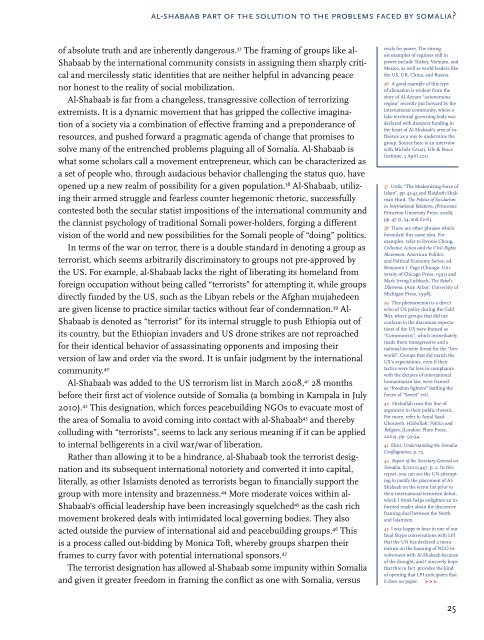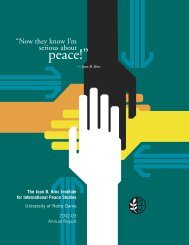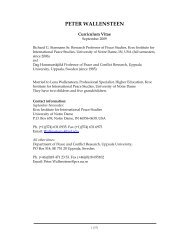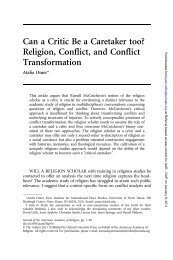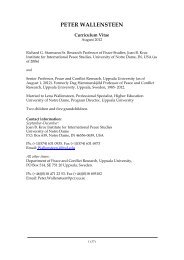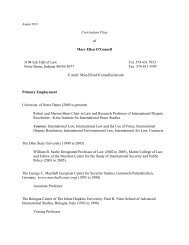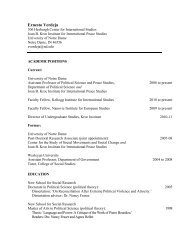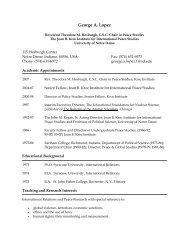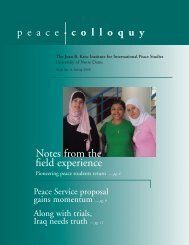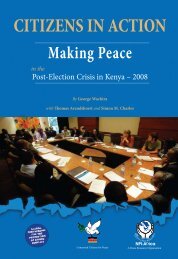Somalia: Creating Space for Fresh Approaches to Peacebuilding
Somalia: Creating Space for Fresh Approaches to Peacebuilding
Somalia: Creating Space for Fresh Approaches to Peacebuilding
You also want an ePaper? Increase the reach of your titles
YUMPU automatically turns print PDFs into web optimized ePapers that Google loves.
al-shabaab part of the solution <strong>to</strong> the problems faced by somalia?<br />
of absolute truth and are inherently dangerous. 37 The framing of groups like al-<br />
Shabaab by the international community consists in assigning them sharply critical<br />
and mercilessly static identities that are neither helpful in advancing peace<br />
nor honest <strong>to</strong> the reality of social mobilization.<br />
Al-Shabaab is far from a changeless, transgressive collection of terrorizing<br />
extremists. It is a dynamic movement that has gripped the collective imagination<br />
of a society via a combination of effective framing and a preponderance of<br />
resources, and pushed <strong>for</strong>ward a pragmatic agenda of change that promises <strong>to</strong><br />
solve many of the entrenched problems plaguing all of <strong>Somalia</strong>. Al-Shabaab is<br />
what some scholars call a movement entrepreneur, which can be characterized as<br />
a set of people who, through audacious behavior challenging the status quo, have<br />
opened up a new realm of possibility <strong>for</strong> a given population. 38 Al-Shabaab, utilizing<br />
their armed struggle and fearless counter hegemonic rhe<strong>to</strong>ric, successfully<br />
contested both the secular statist impositions of the international community and<br />
the clannist psychology of traditional Somali power-holders, <strong>for</strong>ging a different<br />
vision of the world and new possibilities <strong>for</strong> the Somali people of “doing” politics.<br />
In terms of the war on terror, there is a double standard in denoting a group as<br />
terrorist, which seems arbitrarily discrimina<strong>to</strong>ry <strong>to</strong> groups not pre-approved by<br />
the US. For example, al-Shabaab lacks the right of liberating its homeland from<br />
<strong>for</strong>eign occupation without being called “terrorists” <strong>for</strong> attempting it, while groups<br />
directly funded by the US, such as the Libyan rebels or the Afghan muja hedeen<br />
are given license <strong>to</strong> practice similar tactics without fear of condemnation. 39 Al-<br />
Shabaab is denoted as “terrorist” <strong>for</strong> its internal struggle <strong>to</strong> push Ethiopia out of<br />
its country, but the Ethiopian invaders and US drone strikes are not reproached<br />
<strong>for</strong> their identical behavior of assassinating opponents and imposing their<br />
version of law and order via the sword. It is unfair judgment by the international<br />
community. 40<br />
Al-Shabaab was added <strong>to</strong> the US terrorism list in March 2008, 41 28 months<br />
be<strong>for</strong>e their first act of violence outside of <strong>Somalia</strong> (a bombing in Kampala in July<br />
2010). 42 This designation, which <strong>for</strong>ces peacebuilding NGOs <strong>to</strong> evacuate most of<br />
the area of <strong>Somalia</strong> <strong>to</strong> avoid coming in<strong>to</strong> contact with al-Shabaab 43 and thereby<br />
colluding with “terrorists”, seems <strong>to</strong> lack any serious meaning if it can be applied<br />
<strong>to</strong> internal belligerents in a civil war/war of liberation.<br />
Rather than allowing it <strong>to</strong> be a hindrance, al-Shabaab <strong>to</strong>ok the terrorist designation<br />
and its subsequent international no<strong>to</strong>riety and converted it in<strong>to</strong> capital,<br />
literally, as other Islamists denoted as terrorists began <strong>to</strong> financially support the<br />
group with more intensity and brazenness. 44 More moderate voices within al-<br />
Shabaab’s official leadership have been increasingly squelched 45 as the cash rich<br />
movement brokered deals with intimidated local governing bodies. They also<br />
acted outside the purview of international aid and peacebuilding groups. 46 This<br />
is a process called out-bidding by Monica Toft, whereby groups sharpen their<br />
frames <strong>to</strong> curry favor with potential international sponsors. 47<br />
The terrorist designation has allowed al-Shabaab some impunity within <strong>Somalia</strong><br />
and given it greater freedom in framing the conflict as one with <strong>Somalia</strong>, versus<br />
rivals <strong>for</strong> power. The strongest<br />
examples of regimes still in<br />
power include Turkey, Vietnam, and<br />
Mexico, as well as world leaders like<br />
the US, UK, China, and Russia.<br />
36 A good example of this type<br />
of alienation is evident from the<br />
s<strong>to</strong>ry of Al-Azzam “au<strong>to</strong>nomous<br />
region” recently put <strong>for</strong>ward by the<br />
international community, where a<br />
fake terri<strong>to</strong>rial governing body was<br />
declared with diaspora funding in<br />
the heart of Al-Shabaab’s area of influence<br />
as a way <strong>to</strong> undermine the<br />
group. Source here is an interview<br />
with Michele Cesari, Life & Peace<br />
Institute, 5 April 2011.<br />
37 Utvik, “The Modernizing Force of<br />
Islam”, pp. 43-45 and Elizabeth Shakman<br />
Hurd, The Politics of Secularism<br />
in International Relations, (Prince<strong>to</strong>n:<br />
Prince<strong>to</strong>n University Press, 2008),<br />
pp. 47-51, 54, and 62-63.<br />
38 There are other phrases which<br />
<strong>for</strong>mulate this same idea. For<br />
examples, refer <strong>to</strong> Dennis Chong,<br />
Collective Action and the Civil Rights<br />
Movement, American Politics<br />
and Political Economy Series, ed.<br />
Benjamin I. Page (Chicago: University<br />
of Chicago Press, 1991) and<br />
Mark Irving Lichbach, The Rebel’s<br />
Dilemma, (Ann Arbor: University of<br />
Michigan Press, 1998).<br />
39 This phenomenon is a direct<br />
echo of US policy during the Cold<br />
War, where groups that did not<br />
con<strong>for</strong>m <strong>to</strong> the draconian expectations<br />
of the US were framed as<br />
“Communists”, which immediately<br />
made them transgressive and a<br />
national security threat <strong>for</strong> the “free<br />
world”. Groups that did match the<br />
US’s expectations, even if their<br />
tactics were far less in compliance<br />
with the dictates of international<br />
humanitarian law, were framed<br />
as “freedom fighters” battling the<br />
<strong>for</strong>ces of “Soviet” evil.<br />
40 Hizbullah uses this line of<br />
argument in their public rhe<strong>to</strong>ric.<br />
For more, refer <strong>to</strong> Amal Saad-<br />
Ghorayeb, Hizbu’llah: Politics and<br />
Religion, (London: Plu<strong>to</strong> Press,<br />
2002), pp. 93-94.<br />
41 Elmi, Understanding the <strong>Somalia</strong><br />
Conflagration, p. 75.<br />
42 Report of the Secretary-General on<br />
<strong>Somalia</strong>. S/2010/447, p. 2. In this<br />
report, you can see the UN attempting<br />
<strong>to</strong> justify the placement of Al-<br />
Shabaab on the terror list prior <strong>to</strong><br />
their international terrorism debut,<br />
which I think helps enlighten an in<strong>for</strong>med<br />
reader about the discursive<br />
framing duel between the North<br />
and Islamism.<br />
43 I was happy <strong>to</strong> hear in one of our<br />
final Skype conversations with LPI<br />
that the UN has declared a mora<strong>to</strong><br />
rium on the banning of NGO involvement<br />
with Al-Shabaab because<br />
of the drought, and I since rely hope<br />
that this in fact provides the kind<br />
of opening that LPI anticipates that<br />
it does on paper. > > ><br />
25


